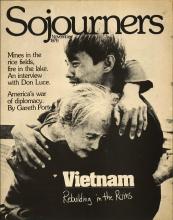Orlando Letelier served in the democratically elected government of Salvador Allende in Chile; after the 1973 coup, he was tortured and exiled by the military dictatorship, against whose human rights abuses he continued to speak out. On September 21, 1976, he and a co-worker were killed by a car bomb in Washington, D.C. Several operatives of the Chilean secret police were later convicted of his murder. This is the homily delivered at his funeral by the General Secretary of the National Conference of Catholic Bishops. --The Editors
The event of another's death always sharpens our view of life. Orlando [Letelier]'s life recalls the text of the reading from Daniel: "Those who lead the many to justice shall be like the stars forever." The legacy of his life's work permeates this community today as a symbol of hope. Faced with this symbol, the power of death is feeble.
We ponder the words of Jesus, words of hope and life illuminated by the mystery of his own death and resurrection: "Unless the grain of wheat falls to the earth and dies, it remains just a grain of wheat. But if it dies, it produces much fruit."
Jesus of Nazareth, who died a violent death but rose to conquer the power of death, is the foundation of hope. The goal of Christian hope is the new Jerusalem of which St. John writes, the city in which "there shall be no more death or mourning, crying out or pain" (Revelation 21:5). We are on the way to the heavenly city, to the kingdom of God, but we move as pilgrims, journeying as the Israelites once did in the desert.
Read the Full Article

